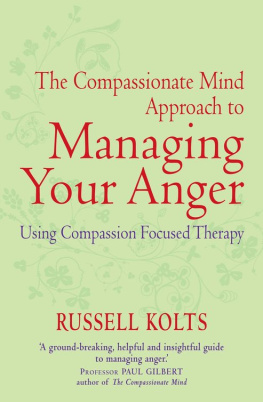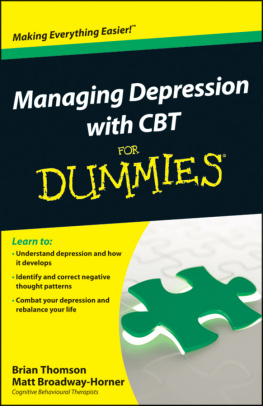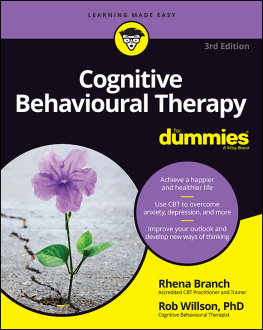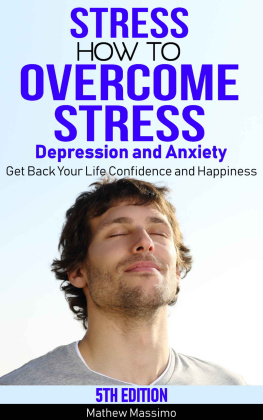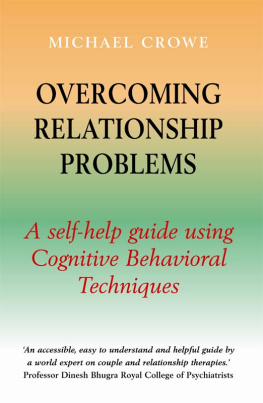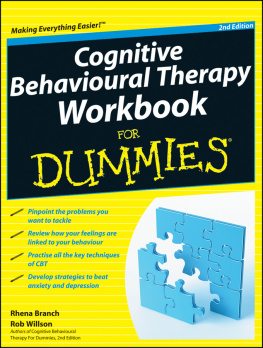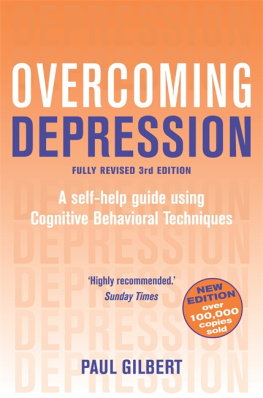Title Page
BEAT DEPRESSION WITH
SELF-HELP TECHNIQUES
Andrew Vass
Publisher Information
Apex Publishing Ltd
First published in 2005 by Apex Publishing Ltd
PO Box 7086, Clacton on Sea, Essex, CO15 5WN, England
www.apexpublishing.co.uk
Digital Edition Converted and Distributed in 2011 by
Andrews UK Limited
www.andrewsuk.com
Copyright 2005 by Andrew Vass
The author has asserted his moral rights
British Library Cataloguing-in-Publication Data
A catalogue record for this book is available from the British Library
All rights reserved. This book is sold subject to the condition, that no part of this book is to be reproduced, in any shape or form. Or by way of trade, stored in a retrieval system or transmitted in any form or by any means, electronic, mechanical, photocopying, recording, be lent, re-sold, hired out or otherwise circulated in any form of binding or cover other than that in which it is published and without a similar condition, including this condition being imposed on the subsequent purchaser, without prior permission of the copyright holder.
Production Manager: Chris Cowlin
Cover Design Jenny Parrett
Preface
Many writers have tried to convince people about the value of self-help techniques for coping effectively with depression. It would appear that they have often failed. Sometimes this is because the ideas and techniques they advocated have been either trivial or inadequate to the tasks of helping people with depression. Some books offer ideas and techniques, which are considered to be wrong by leading scientists.
Yet the need for self-help techniques seems undisputable. Newspapers are always reporting on celebrities who become depressed, lose confidence, or suddenly act in bizarre ways. Executives in business companies are reportedly suffering from anxiety or burn out. Many teenagers, suddenly facing the emotional roller-coaster rides of adulthood; with exam stress, relationship problems, career related difficulties, and drugs-induced - negative moods dragging them down, come close to being suicidal.
Yet the potential for self-help techniques to solve such problems is actually very good. There are some approaches to self-help, which are undoubtedly approved of by the scientists who investigate the empirical evidence of therapeutic outcomes. There are respectable writers who have written very useful and interesting books on self-help. Often, however, such books fail to combine the following qualities, which many readers need when they read such books. These are: Clarity, Brevity, Depth of Analysis, and Upbeat Interesting Writing. Another problem is that writers often adopt an ideological approach. This means they focus only on one approach to selp-help. Their enthusiasm for this one approach causes a great deal of time and space being invested in the theoretical basis for the idea. Their ideas may be great but the reader has lost sight of the trees, because the wood was too thick. This book in contrast, has the qualities I have referred to above. It is designed for people who want to improve their lives, escape from the tendency to suffer from depression, and generally become happy.
The book has adapted techniques from: Person Centred Therapy, Counselling, Cognitive Behavioural Therapy, Rational Emotive Behavioural Therapy, Hypnotherapy, Sport Therapy and Stoic Philosophy to help people to use Self-Counselling techniques for the treatment of depression. I think that list sounds interesting. For this reason, my book should be useful to school students, and young adults, as well as to middle aged and elderly people. A highly valued friend, Margaret Jarvie (a leading educational theorist and counsellor in Scotland) wrote:
This is a book, which is long overdue as it provides guidelines for anyone with a concern for personal growth. The advantages of having an identified framework and methodogy to apply to personal and social education is that it provides a structured approach which remains flexible. It is as a result of this, particularly appropriate in the context of personal and social education. The points made in the context of Personal and Social education programmes are equally valid in situations that pertain between parents and their offspring as well as to individuals. One cannot help wondering if we would not create a better world to live, if all of us learnt and used the skills which this author sets to equip us with.
Margaret Jarvie, who has now sadly passed away, was an invaluable helper to me as I wrote this book. Her encouragemnet kept me on track. I acknowledge her contribution with my full respect.
My aim has been to demystify the Cognitive Therapies so that their usefulness is very clearly explained with interesting examples showing the benefits of Self-Help Therapy and the relevance of the theories of self-help treatments for depression. I hope that the success of this project will lead to the Cognitive Therapies becoming readily understood and used by both young and the old. In schools, homes, businesses, and libraries this book can be of value. It has both general relevance and specific value to mature people and many theatres of life.
What more do I need to say but read on and learn how to do Self-Counselling. This study could well transform your life.
- Andrew Vass, April 2004
Self-Counselling is Important
Task 1:Getting in touch with your inner world
When we go through a period of personal failure or a very upsetting time, we can either grow and develop through it or remain stuck in sad and depressing reactions. It has been found that if we suffer feelings of failure in childhood we may develop an inner discouraged layer, and then we hold on to this discouraged child part in our personality long into adulthood. This inner child part then tends to give us negative beliefs which confirm us in discouraged and anxious reactions when faced by future difficult events. So the learned sense of helplessness and discouragement makes us more easily depressed when we face new difficulties.
All through our lives such experiences occur, and all through our lives we are either growing or else being slowed down by negative reactions. We dont always recognise these negative reactions as being depressing. For example, feelings of sadness, anxiety or anger can be linked to depression, although this is not generally understood by the public at large. However, strong negative feelings all contribute to depressive thinking even when we dont feel we have become clearly depressed. We can, for example, become stuck with feelings of anger and not actually realise its depressing effects. The key to moving on from such difficult events is to achieve some kinds of resolution of the difficulties. But how can you get in touch properly with your inner world of feelings and thoughts so as to gain resolution? One way to do this is to become your own counsellor and understand the value of self-counselling.
Task 2: To understand self-counselling
Carl Rogers, the founder of person-centred therapy, inspired the development of the counselling approach. He believed that if you paid attention to surface feelings you could get in touch with deeper feelings. Just by spending time sensing your own experiences you could achieve fuller self-awareness1 . It can be compared to peeling off the layers of an onion. Rogers believed that by studying feelings you could get to know your authentic self. This book is inspired partly by Carl Rogers, so I recommend that you try to investigate self-empathy which is the skill of attending to and exploring your own feelings (see glossary).
One way to do this is to write a dialogue with yourself. It is as if you are writing a play. Start with Me and write something about a problem you are facing at the moment and how it makes you feel. Then write down C (for counsellor) and try to suggest any feelings you may have and what the effects of them might be. Okay, see my example below of a young woman who was upset about having to leave the country she grew up in, and move nearer to her relatives.
Next page


